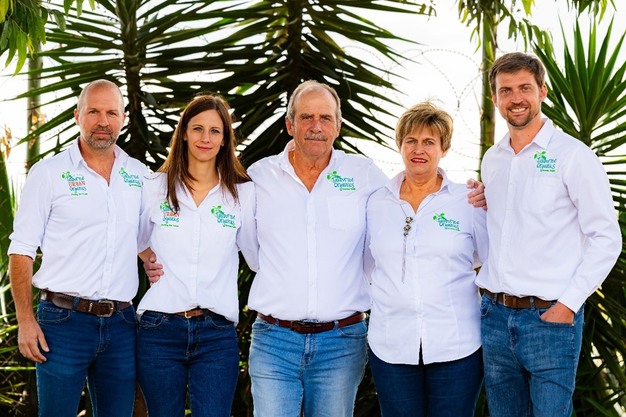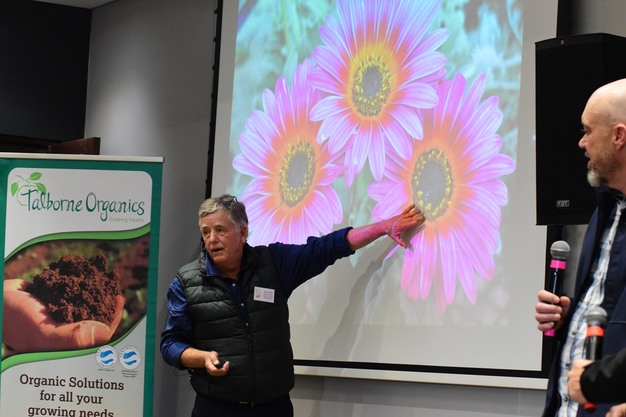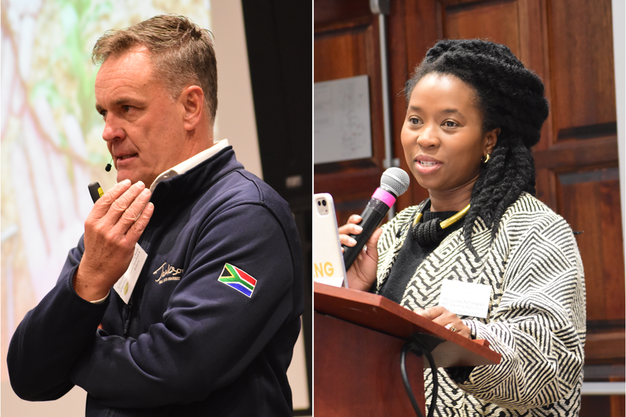"I have one sentence only – it works," declared landscaper Arthur Mennigke as he described creating a vegetable garden in the semi-desert Northern Cape, at the quarter-century anniversary of fertiliser company Talborne Organics, a favourite among regenerative organic farmers and home gardeners alike, selling 5 million kilograms annually in South Africa and growing at an average of 10 to 20% per year across all market sectors
Decades ago, Mike and Jenny Slabber became aware of the harmful overuse of synthetic chemical fertilisers, resulting, they say, in damage to ecosystems and environmental pollution. Talborne was their practical answer, mimicking natural processes and feeding the whole rhizosphere, instead of supplying single-nutrient "quick fixes" of fertilizers to spur on crop yields while sacrificing healthy soils.
In composition, Talborne is one of only three similar fertilizers in the world, the company says, manufactured from natural sources of animal, plant, and minerals, containing no animal manures nor synthetic chemicals and fillers. "Our products stand out for the complete nutrition they offer, over 23 essential plant nutrients, with amino acids and a carbon base for effective uptake," says Jenny Slabber.
Talborne recently attained registration of its Vita Fertilizer range for distribution within the United Arab Emirates and intends expansion across all production areas in South and Southern Africa, where crop farming is expanding rapidly.
 © Talborne Organics Grant Gove and Claire Gove of Talborne Urban Organics, founders Mike and Jenny Slabber, and Marc Slabber, managing director of Talborne Organics
© Talborne Organics Grant Gove and Claire Gove of Talborne Urban Organics, founders Mike and Jenny Slabber, and Marc Slabber, managing director of Talborne Organics
"We're on the cusp of a breaking wave"
Initial scepticism of Talborne's "new-fangled ideas" has caught up in the intervening years with the realization that much has been sacrificed in the pursuit of yield-driven monoculture and that soil microbes cannot be left out of the reckoning.
Mineral depletion has assumed tremendous proportions on South Africa's soils, Claire Gove, managing director of Talborne Urban Organics, told delegates at the 25th birthday celebration. "There's still a big change that needs to take place, but we're on the cusp of a breaking wave," she said. "Our world is toxic, our bodies are inflamed, and we need good quality food."
"Many synthetic fertilizers contain up to 50% fillers to bulk up the bag, thereby tricking the buyer into thinking they are getting a good deal, but it adds no nutrient value," Marc Slabber, MD of Talborne Organics, asserts. "What often seems cheap, water-soluble fertilizers can result in up to 50% leaching losses due to heavy rains or irrigation."
Slabber refers to the advantages of nutrient density of the fertilizer proven by high Brix readings on crops grown with Talborne, and additional savings as it lasts longer in the soil and therefore reduces the number of field applications needed, resulting in farmers saving costs on fuel, labor, and time while minimizing soil compaction by heavy vehicles.
Organics sector no longer niche
Talborne forms part of a rapidly expanding organics and natural products industry in South Africa, which is no longer a niche sector but, according to an analysis done by Standard Bank in 2025, extends to R1 billion worth of annual sales.
 © Carolize Jansen | FreshPlaza.com
© Carolize Jansen | FreshPlaza.com
Andy de Wet and Quinton Bean, renowned flower breeders, enthusiastically endorse Talborne fertilisers
The praise for Talborne's merits were echoed by vegetable farmers of mostly brassicas and carrots, James Kelly and Warren Milbank of Southern Block Farming in KwaZulu-Natal, by Gary Jackson, founder of Jackson's Real Food Market & Eatery in Johannesburg and by ornamental plant breeders Andy de Wet and Quinton Bean who raised their 2023 Chelsea gold medal winner agapanthus 'Black Jack' on Talborne.
They run small-scale scientific trials of every commercially available fertilizer against Talborne as the benchmark, De Wet told the gathering. "I can attest to the fact that there is nothing on the market that competes; Talborne always comes up first."
Livingseeds' Sean Freeman, grower and supplier of more than a thousand varieties of heirloom vegetable seeds, shared that he also runs fertilizer trials on his farm and he agrees: his seeds perform best when grown with Talborne products.
A political ally for regenerative agriculture
Sharing in the zeal for organic food is Gary Jackson, a Johannesburg entrepreneur who started Jackson's Real Food Market, stocking, among others, SOGA Organics oranges grown with Talborne Organics. Jackson said he has witnessed the transformation of chronically ill people brought about by nutrient-dense organic vegetables.
 © Carolize Jansen | FreshPlaza.com
© Carolize Jansen | FreshPlaza.com
Left: Gary Jackson of Jackson's Real Food Market in Johannesburg. Right: Vuyiswa Ramokgopa, Gauteng Member of the Executive Council for Agriculture and Rural Development
Also attending Talborne's 25th birthday celebration, the Gauteng minister for agriculture and rural development, Vuyiswa Ramokgopa, told delegates that she was very happy to lead this portfolio. "I get to hang out with interesting and colourful people like Gary, who was one of the first people I engaged with. Gary, along with various representatives from the organic ecosystem, sat me down and opened my eyes to what was out there, but also, more importantly, what was possible if we support and invest in this industry."
In Gauteng, urban sprawl is swallowing agricultural land at an alarming pace, Ramokgopa said, but "regenerative organic practices offer us an alternative that restores fertility, conserves water, sequesters carbon, and strengthens local food sovereignty."
She continued: "Even here, amidst the concrete and the commerce, millions live daily without food. Parents are skipping meals so that their children can have something to eat. Nutrient-dense food, grown well without chemicals, is priced out of reach for the very people who are charged with growing it."
Food grown with dignity and with care goes to the heart of food sovereignty, the MEC remarked. "It's a painful reality that obesity, which millions of South Africans suffer from, is ultimately a sign of malnutrition and exacerbated by poverty."
Talborne Organics has always shared its passion for healthy food production with large commercial farming operations and with home gardeners. "We share our extensive knowledge gained over the years, and we also spread the message of beautifying our planet with ornamental gardening for the pleasure and mental health of people while feeding our beneficial insects and birdlife with pollen, nectar, and grass seeds," Slabber remarked.
![]() For more information:
For more information:
JH Cilliers (Sales Manager, Talborne Organics (Agri)
Talborne Organics
Tel: +27 13 933 3172
Email: [email protected]
https://talborne.co.za/
